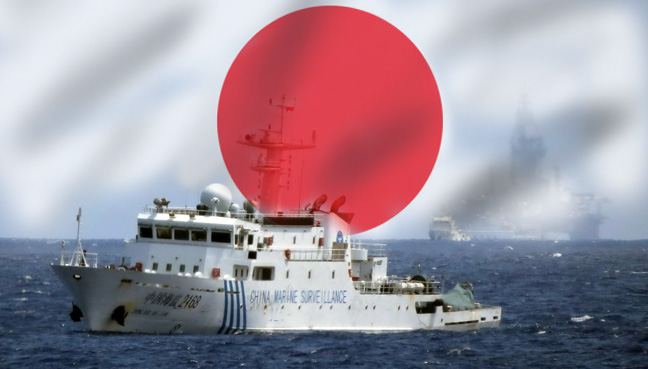A Chinese spy ship entered Japan’s territorial waters on Wednesday as Tokyo conducted a joint exercise with the United States and India, Japanese officials said.
 A Chinese spy ship entered Japan's territorial waters on Wednesday as Tokyo conducted a joint exercise with the United States and India, Japanese officials said.
A Chinese spy ship entered Japan's territorial waters on Wednesday as Tokyo conducted a joint exercise with the United States and India, Japanese officials said.
Japan quickly voiced "concerns" over the intrusion as it came less than a week after another Chinese naval vessel sailed near islands at the centre of a Tokyo-Beijing sovereignty dispute in the East China Sea.
"The Chinese military vessel moved in after an Indian ship sailed into Japan's territorial waters as it participated in a Japan-US-India joint exercise," Gen Nakatani, defense minister, told reporters.
Japanese defense ministry officials declined to speculate why the 6,000-ton "information gathering" vessel sailed into the area, but Nakatani said China, as Japan's neighbor, must act "carefully".
A Japanese navy surveillance aircraft spotted the Chinese ship around 3:30 am (1830 GMT Tuesday) in territorial waters near Kuchinoerabu island in southern Japan, said Hiroshige Seko, a government spokesman.
Tokyo did not immediately say by how much the Chinese ship breached its territorial waters, which international law stipulates are a 12-nautical-mile band offshore.
The area is part of a Japanese island chain that divides the East China Sea and the Pacific Ocean, and is not subject to the territorial dispute.
China's navy was conducting a "normal exercise" and passing through international waters in the Tokara Strait where "all countries can have the right of innocent passage," foreign ministry spokesman Lu Kang said in Beijing.
"There is no need to provide notification or to get authorization in advance," Lu told a regular briefing.
"So if Japan insists on hyping up this issue in the media, we have to question its motives."
China's defense ministry also said in a statement that its ship's actions were in accordance with international law.
The Chinese ship sailed southeast and exited Japanese waters around 5 am heading into the Pacific, Japan's Seko told a press briefing.
Wednesday's incursion came less than a week after another Chinese naval ship sailed close to the disputed islands further south in the East China Sea, though it did not enter what Japan sees as territorial waters.
'Thorough measures'
Japan said last week that a Chinese frigate sailed into "contiguous waters" surrounding the contested East China Sea islands last Thursday.
Contiguous waters are a 12-nautical-mile band that extends beyond territorial waters. Under international rules, they are not the preserve of any single country, although the resident power has certain limited rights.
It marked the first time a Chinese navy ship had approached so close to the disputed islets and an angry Japan summoned Beijing's ambassador to protest.
Separately, China sent three coastguard ships inside territorial waters of the disputed isles on Wednesday afternoon, hours after Japan complained about the naval intrusion.
China does not recognize Japan's claim to the disputed islands -- known as Senkaku in Japan and Diaoyu in China -- and says its ships have the right to sail freely in Chinese territorial waters.
International laws allow ships of all states to exercise the right of "innocent passage" -- cited by Lu -- through territorial sea.
A Chinese nuclear submarine entered Japanese waters in 2004.
Concerns over China's rising military presence in Asian waters have sparked worries in Japan.
Relations deteriorated in 2012 when Tokyo "nationalized" some of the disputed uninhabited islets. The countries have taken steps to mend fences but relations remain tense.
The response from Japan this time was more muted, however, with the government conveying its "concerns about the Chinese military's activities in general", Seko said.
"The government will continue to take thorough measures to patrol the air space and waters surrounding our nation," he added.
Japan has expressed concern over Chinese land reclamation and expansion of military facilities in the South China Sea, where Beijing has disputes with countries including Vietnam and the Philippines.